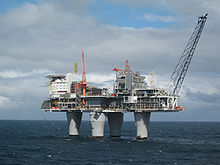Idemitsu Kosan
It was among the ten petroleum suppliers selected by the Ministry of International Trade and Industry (MITI) and cut its ties with Nippon Oil.Iranian prime minister Mohammed Mosaddeq had recently nationalized the oil fields and was under British-led embargo (Abadan Crisis).Again, it got a good price at 40% below market value but angered the United States who decided to boycott Idemitsu when buying fuel for its military jets in Japan.[10] The company also came in conflict with the Petroleum Association of Japan which was set up by MITI to restrict production and Idemitsu even left the organization.[7] The company continued its vertical integration strategy of controlling the whole supply chain with more tankers and opening petrol depots and warehouses.[7][8] The company diversified into coal, importing from Australia and bought mines in Muswellbrook, New South Wales and Ebenezer, Queensland.The Japanese government eventually settled on a compromise that would slowly open for free importation and remove production quotas on refineries.Akihiko Tembo, the first president from outside the founding family, instituted several reforms to alleviate the company's finances, including cutting retroactive discounts offered to distributors.[12] In the 1990s, Idemitsu began opening service stations outside Japan, in Portugal and Puerto Rico, as well as a lubricant factory in the United States.[15] In 2016, Idemitsu management announced plans to merge the company with Showa Shell Sekiyu, the fifth-largest oil wholesaler in Japan.The transaction was opposed by the founding Idemitsu family for several reasons, reportedly including ongoing friction between the family and Tembo's management team, cultural differences between the two companies, geopolitical issues (Idemitsu being a major importer of Iranian oil while Showa Shell would remain partly owned by Saudi Aramco), and pressure from rival JX Nippon Oil & Energy which was simultaneously planning its own merger with TonenGeneral.[12] Without approval from the Idemitsu family for a full merger, company management purchased 31% of Showa Shell in December 2016, and launched partnerships in refining and logistics starting in April 2017.[26] As of 2008[update] Idemitsu Kosan is planning to build the Nghi Son Refinery in Vietnam in a joint venture with Kuwait Petroleum International, Vietnamese state-owned PetroVietnam and Mitsui Chemicals.Basic chemicals produced includes olefins such as ethylene and propylene, and aromatics like benzene, para-xylene and styrene monomer.



Idemitsu (disambiguation)ŌtemachiChiyoda, TokyoTrade nameRomanizedPublicTraded asNikkei 225Oil and gasSazō IdemitsuPetrochemicalSaudi Aramcooil platformsrefineriesgas stationsFortune Global 500Tokyo Stock ExchangeShowa Shell SekiyuNippon Oilnorthern KyushuShimonosekiSouth Manchuria RailwayManchuriaDalianStandard OilAsiatic Petroleum CompanyTaiwanJapanese invasion of Manchuriaoil tankerkabushiki kaishaPacific WarAllied occupation of JapanMinistry of International Trade and IndustrynaphthaVenezuelaprotectionistTokuyama RefineryNissho MaruMohammed MosaddeqAbadan Crisis1953 Iranian coup d'étatPetroleum Association of Japanvertical integrationNiigata PrefectureSea of JapanFinnishNeste OySnorre oil fieldMuswellbrookNew South WalesEbenezer, Queenslandgeothermal poweruranium miningCamecoCogema1985 price drop on oilPioneerSamsung ElectronicsGalaxysmartphonesMitsubishi CorporationMitsui ChemicalsPuerto Ricolong economic crisisPhilippinespublicly tradedinitial public offeringJX Nippon Oil & EnergyTonenGeneralcrude oilNorwegianNorth SeaNorth Sea oilIwafuneVietnamThailandCambodiaZarubezhneftVietnam Oil & Gas Group (Petro Vietnam)oil tankersHokkaido RefineryHokkaidoIchiharaTokuyamaOkinawaNghi Son RefineryKuwait Petroleum InternationalPetroVietnamDung Quat Refineryservice stationsApolloolefinsethylenepropylenearomaticsbenzenepara-xylenestyrenecircuit boardscrackersLubricants1,4-ButanediolGlobal OLED Technology LLCorganic light emitting diodeAlaskaCigar Lake MineŌita Prefecturepentanebiofuelnon food cropsethanol fuelIdemitsu Museum of Artsmotorcycle trialUltra IdemitsujinUltramanLCR Honda IdemitsuMotoGPmotorcycle racingIMSA Idemitsu Mazda MX-5 CupFortune MagazineBloombergBloomberg L.P.Japan Exchange GroupAnswers.comEncyclopædia BritannicaTime magazine